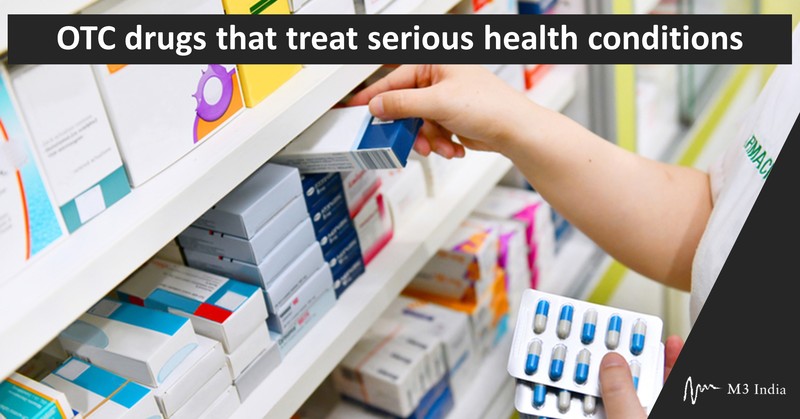OTC drugs that treat serious health conditions
M3 Global Newsdesk Feb 29, 2020
Over 300,000 over-the-counter (OTC) drugs are currently on the market, according to the FDA. This vast number should come as no surprise given that OTC drugs are convenient, readily available, and relatively cheap. These drugs are most often used to treat minor illnesses and injuries. But, are they effective against more serious health conditions? Here’s a closer look at five serious ailments that can be treated with OTC drugs.

Venous thromboembolism
Venous thromboembolism (VTE) is a life-threatening medical condition and a common postoperative complication. While anticoagulant therapy is the primary treatment, some researchers have suggested that aspirin may be a viable prophylactic therapy for VTE.
Although aspirin is an old medication—dating all the way back to 1897—its dosage and efficacy are still being investigated in various surgical contexts, including hip preservation surgery (HPS).
For instance, in one retrospective study, researchers assessed the efficacy of aspirin for VTE prophylaxis in a large cohort of over 600 patients (mean age: 34.3 years) undergoing HPS. Patients received either 325-mg aspirin or 81-mg aspirin twice daily, and were followed prospectively for 90-day postoperative complications (ie, pulmonary embolism, deep venous thrombosis, and major bleeding events). Overall, only two patients developed VTE following HPS.
The authors concluded:
"Aspirin is a safe and an effective modality in minimising the risk of VTE in patients undergoing HPS.”
Migraine
With migraine treatment, prescription triptans and ergotamines immediately come to mind. But, non-prescription treatment appears to be effective, too. For instance, in a study of outpatients with migraine who were given either acetaminophen or placebo, researchers found that 52% of patients treated with 1,000 mg acetaminophen had little or no migraine pain at 2 hours compared with 32% of patients given a placebo.
Authors of the study concluded that,
“Acetaminophen 1000 mg, a non-prescription drug, is an effective and well-tolerated treatment for episodic and moderate migraine headache. In addition, acetaminophen generally provided a beneficial effect on associated symptoms of migraine including nausea, photophobia, phonophobia, and functional disability.”
More recently, in a research review of randomised trials, researchers reported that high-dose aspirin (900 mg to 1,300 mg) is effective against acute migraine when taken at symptom onset. They also found evidence that daily aspirin (81 mg to 325 mg) can prevent recurrent migraine headaches.
Lastly, antiemetics may also provide moderate migraine relief. Common OTC antiemetics include diphenhydramine, and bismuth subsalicylate.
Gastroesophageal reflux disease
A variety of proton-pump inhibitors (PPIs) are available, including OTC options such as omeprazole (Prilosec), pantoprazole (Nexium), and lansoprazole (Prevacid). Initially intended to treat reflux esophagitis, these potent gastric-acid inhibitors revolutionized the treatment of several syndromes due to acid reflux, acid secretion, or acid hypersecretion.
The use of PPIs has exploded worldwide, with the drugs viewed as relatively safe. Bear in mind that an estimated 5% to 10% of people with untreated gastroesophageal reflux disease go on to develop Barrett’s esophagus, with 1% of people with this precancerous lesion eventually developing esophageal cancer.
According to the authors of one review published in BMC Medicine:
“The overwhelming message is that the problem with PPIs is that they are good, very good. Consequently, there are a lot of valid indications for their use. However, clinicians cannot be complacent, thinking that the overwhelming efficacy of the drugs in the treatment of peptic esophagitis and ulcer disease will be matched in all other putative applications.”
Common cold
No matter how miserable the symptoms, the common cold is often perceived as harmless. But rhinovirus infection can be more than bothersome; in those with weakened immune systems, for instance, it can be deadly.
Fortunately, there are OTC medications that can take the edge off the common cold. Researchers of a survey-based study published in the International Journal of Clinical Practice showed that an ibuprofen-pseudoephedrine combination helped ease common cold symptoms in a dose‐dependent relationship. Moreover, the effects of this combination were best when treatment was started within 2 days of symptom onset.
Burn wounds
For uninfected chronic wounds, OTC topical antimicrobial therapy likely won’t help. This fact flies in the face of what most people think when they reach for a topical antibiotic immediately after sustaining a wound.
However, topical antibiotics may be effective for the treatment of burn wounds. Some researchers have shown that topical antibiotics—including OTC drugs like mupirocin, bacitracin, iodine, and hydrogen peroxide—can help treat infection and prevent sepsis by eliminating wound bacteria. These agents may also help with neutralizing odors due to non-healing, necrotic wounds. Furthermore, topical antibiotics can be added to systemic antibiotics to treat certain types of ischemic wounds.
Also, topical antimicrobial therapy may prove beneficial in combating biofilms, which are aggregations of different species of bacteria enveloped in a protective glycocalyx that adhere to the surface of the wound. Although found in only 6% of acute wounds, biofilms are present in more than 90% of chronic wounds. An emerging corpus of research indicates that biofilms may mediate the formation of non-healing wounds.
This story is contributed by Naveed Saleh and is a part of our Global Content Initiative, where we feature selected stories from our Global network which we believe would be most useful and informative to our doctor members.
-
Exclusive Write-ups & Webinars by KOLs
-
Daily Quiz by specialty
-
Paid Market Research Surveys
-
Case discussions, News & Journals' summaries